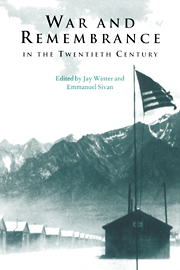Book contents
- Frontmatter
- Contents
- Preface
- Introduction
- 1 Setting the framework
- 2 Forms of kinship and remembrance in the aftermath of the Great War
- 3 War, death, and remembrance in Soviet Russia
- 4 Agents of memory: Spanish Civil War veterans and disabled soldiers
- 5 Children as war victims in postwar European cinema
- 6 From survivor to witness: voices from the Shoah
- 7 Landscapes of loss and remembrance: the case of Little Tokyo in Los Angeles
- 8 The Algerian War in French collective memory
- 9 Private pain and public remembrance in Israel
- 10 Personal narratives and commemoration
- 11 Against consolation: Walter Benjamin and the refusal to mourn
- Index
- Studies in the Social and Cultural History of Modern Warfare
Preface
Published online by Cambridge University Press: 27 October 2009
- Frontmatter
- Contents
- Preface
- Introduction
- 1 Setting the framework
- 2 Forms of kinship and remembrance in the aftermath of the Great War
- 3 War, death, and remembrance in Soviet Russia
- 4 Agents of memory: Spanish Civil War veterans and disabled soldiers
- 5 Children as war victims in postwar European cinema
- 6 From survivor to witness: voices from the Shoah
- 7 Landscapes of loss and remembrance: the case of Little Tokyo in Los Angeles
- 8 The Algerian War in French collective memory
- 9 Private pain and public remembrance in Israel
- 10 Personal narratives and commemoration
- 11 Against consolation: Walter Benjamin and the refusal to mourn
- Index
- Studies in the Social and Cultural History of Modern Warfare
Summary
There is a rough common denominator in this book, fashioned through discussion among contributors. We all refer in different ways to what may be termed a ‘social agency’ approach, which highlights the behaviour not of whole societies or of ruling groups alone, but rather of those groups and individuals, frequently but not always obscure, who do the work of remembrance. This interpretation is set out by the editors in the first chapter, in which many of the conceptual problems in the study of ‘collective memory’ are addressed. We hasten to add that the contributors to this volume have adopted very different approaches to the problem of ‘social agency’, collective memory, and victimhood. These differences are discussed in the introduction. Our intention is simply to introduce a rich field of historical inquiry – that of collective memory – and to clarify its topography by reference to the experience of war in this century. No orthodoxy arises here, though a number of questions in common recur throughout this volume.
Thanks are due to many people and groups whose support and assistance we are happy to acknowledge. A grant from the Harry Frank Guggenheim Foundation made this collective investigation possible. The encouragement, support, and critical participation of Karen Colvard and James Hester of the Foundation were of the greatest importance. They joined the contributors and a number of other scholars at two fruitful meetings in 1995 and 1996 at Pembroke College, Cambridge and Chinchón, Spain, where these questions were formulated and some approaches to them thrashed out.
- Type
- Chapter
- Information
- War and Remembrance in the Twentieth Century , pp. vii - viiiPublisher: Cambridge University PressPrint publication year: 1999

